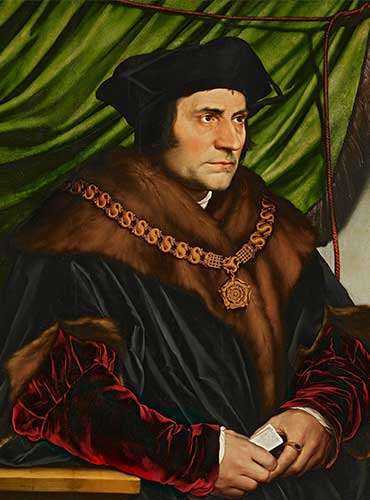Saint John Fisher, bishop, and Thomas More, martyrs – June 22nd
Today we celebrate the memorial of Saints John Fisher and Thomas More. Both were martyred in England by King Henry VIII, and the two of them are remembered mostly for that. Indeed, today the two are invoked with great frequency as martyrs for religious liberty and freedom of conscience. However, today I want to point out briefly something else, something about Thomas More, and that is that he was a father of a family, an exemplar father. What I will say about him can be applied equally mothers and to spiritual fathers and mothers as well.
There are three things that really stand out in More as a father: first, his self-control, second, his concern for the education of his children, and, third, his presence in the life of his children. These three elements, self-control, education, and presence, make him an excellent role model for parents.[1]
First, More had great self-control. The father of six children, he also had many other young people living under his roof. One of these people, his future son-in-law, noted that in 16 years, he never once saw More angry. That doesn’t mean that More didn’t get angry (and, with six kids, I imagine he did), but that he didn’t show it. The one who gets angry, or corrects in anger, loses. The first requirement for the parent who wants to form virtuous children is that they themselves be virtuous; no one can give what they don’t have. This doesn’t mean that More didn’t punish his children; in a letter to his daughter, he writes, “You know how often I have kissed, how rarely spanked you, and then only with a peacock’s tail: even that I wielded gently, with hesitation.” In other words, More punished, but it was always properly measured. There’s no need for words when a glance suffices; there’s no need for punishment when words suffice.
Second, More was very concerned for his children’s education. Recall that in that time, education for women was uncommon, but More insisted his daughters received an education just like that of his sons. Indeed, his daughters were renowned for their learning throughout Europe. Yet, in a letter to their tutor, he reminds them that his children must be formed both in learning and virtue, since the first is worthless without the second.
Lastly, it’s worth noting More’s presence in the life of his children. As the King’s representative, More would be away on trips, and would often be in close contact and conversation with important leaders, artists, poets, and writers. Yet, he wrote letter after letter after letter to his children, and insisted that they too write to him, almost every day. He wouldn’t accept excuses. . . . Why? This was so that, even if he were physically absent, he would be spiritually present to them. In another letter to his daughter, he writes, “the man who would not weep at the tears of his child is a brute unworthy to be called a father.” But, how would a man know about his children’s tears, unless he were involved in their lives?
In short, we shouldn’t assume that Saint Thomas More died a martyr suddenly, or out of the blue. No, rather he lived a daily martyrdom, that of surrendering himself every day to his vocation as a father. His martyrdom was simply the culmination or perfection of his daily martyrdom of being a true father, and, as our Lord Himself taught, there is no greater proof of love than to lay down your life for others. Let us ask, through the intercession of the Blessed Virgin Mary, Queen of the Family, for the grace to imitate Thomas More’s example as a father.
[1] Most of these citations can be found in the excellent work by Thomas J. McGovern, Family, Friendship, and Divine Filiation: St. Thomas More 1478-1535. http://www.christendom-awake.org/pages/mcgovern/tmfamily.htm





